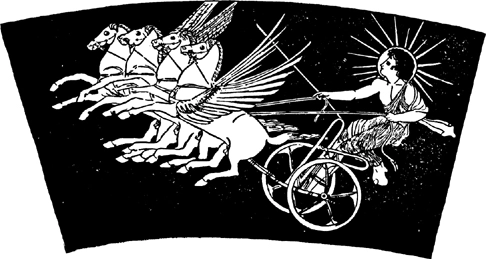The sea itself shrank and narrowed so that what its waters had only lately covered was now nothing but dry sand.
The world was afire, and Phaethon began to suffer from the intolerable heat. Every breath he drew seemed to come from a seething furnace, and the chariot seared the soles of his feet. He was tortured with fumes and blasts of ashes cast up by the burning earth. Smoke black as pitch surged around him, while the horses jounced and tossed him hither and thither. And then his hair caught fire. He fell from the chariot and whirled through space like a shooting star, such as sometimes trails its brightness through the clear sky. Far from his home the broad river Eridanus received him and closed over his throbbing limbs.
His father, the sun-god, who had witnessed this sight of destruction, veiled his radiant head and brooded in sorrow. It is said that this day brought no light to the world. Only the great conflagration shone far and wide.

EUROPA
IN the land of Tyre and Sidon, Europa, daughter of King Agenor, was reared in the seclusion of her father’s palace. Once, at midnight, when mortals are visited by fanciful dreams which have a clear core of truth, Heaven sent her a curious vision. It seemed to her that two continents—Asia and that which lies opposite—in the guise of women, were fighting to possess her. One of the women had a foreign air. The other—and this was Asia—looked and acted like one of Europa’s own countrywomen, and claimed her warmly and vehemently, saying that it was she who had borne and nurtured this lovely child. But the strange woman clasped her in her strong arms like a stolen treasure and drew her away with her. The oddest part of the dream was that Europa did not resist her with any real force or purpose.
“Come with me, little love,” said the stranger. “I shall bring you to Zeus, the Aegis-Bearer, for Destiny has appointed you his beloved!”
Europa awoke. The blood pulsed madly in her temples, and she started up from her couch, for the vision of night had been as bright and distinct as the reality of day. For a long time she sat upright and motionless, staring into space with wide-open eyes, and still seeing the two women before her. At last her lips moved, and she asked herself in alarm: “What god has sent me this vision? What curious dream has beguiled me while I slept, safe in the house of my father? Who was the strange woman? What new yearning quickened my heart at sight of her? How lovingly she approached me, and even when she snatched me away she looked at me with a mother’s tender gaze! May the gods let my dream be for the best!”
Morning had come, and the fair light of day dispelled the darkness of her visions from Europa’s spirit. She rose to busy herself with her usual girlish tasks and pleasures. Friends and companions of her own age gathered about her, the daughters of noble houses, who attended her on her walks, at choral dances, and the rites of offering. They came to conduct their young mistress to a meadow strewn with many flowers, close by the sea where the girls of that region assembled to delight in the mass of blooms and the sound of the surf lapping the shore. All the girls carried baskets, and Europa herself had one of gold, carved with shining scenes from the lives of the gods. It was the work of Hephaestus, and Poseidon, the Earth-Shaker, had given it to Libya in those long-ago days when he was courting her. It had passed from hand to hand until Agenor received it as an heirloom. Swinging this basket, which was more like a bride’s finery than an article for everyday use, lovely Europa ran before her playmates, on to the shoreland meadows bright with color. The girls scattered with merry words and gay laughter, each to pluck those flowers that pleased her fancy. One broke the glistening narcissus, another the fragrant hyacinth; a third chose the fainter-scented violet. Some preferred the spicy thyme, others the yellow crocus. So they ran here and there over the meadow, but Europa soon found what she was seeking.
1 comment